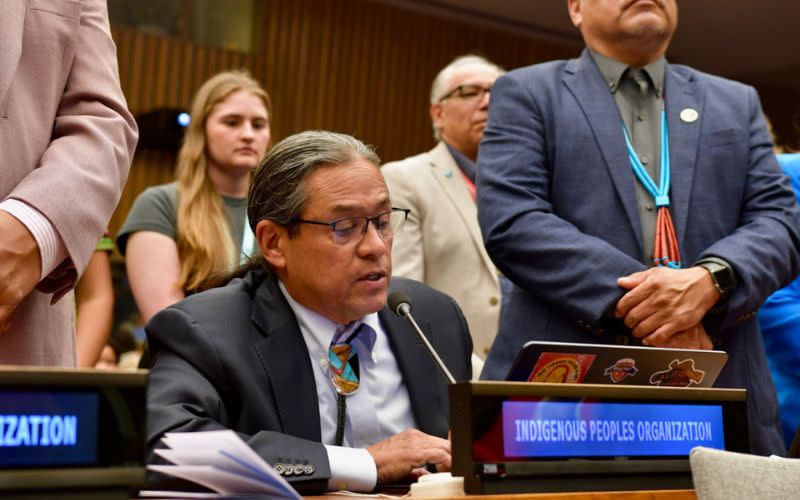NCAI President Calls for Indigenous Participation in United Nations

On the floor of the United Nations Permanent Forum on Indigenous Issues (UNPFII) in New York City last week, National Congress of American Indians President Mark Macarro gave a statement advocating for advanced participation of Indigenous Peoples.
Enhanced Participation refers to a process Indigenous Peoples have been advocating for for over a century, beginning in 1923 with the League of Nations, that would put Indigenous leaders closer to the level of member states at the United Nations (U.N).
Currently, Indigenous leaders are excluded from high-level U.N. bodies like the General Assembly, which decides the U.N. budget, elects member states to the Security Council, and sets other key international goals and policies. Additionally, Native people are only able to participate in the UN system as non-governmental organizations, rather than tribal nations.
Last April at the UNPFII, Csaba Kőrösi, President of the General Assembly, held a final hearing on enhanced participation of Indigenous peoples.
“While member states are the decision makers, Indigenous Peoples have an opportunity to significantly shape those decisions. Indigenous Peoples must have those opportunities,” Kőrösi said.
On Tuesday, Chairman Macarro, a member of the Pechanga Band of Indians in California, echoed Kőrösi’s sentiment on the floor of the UNPFII.
“As sovereign peoples who have governed ourselves on our homelands since time immemorial, we should rightfully be able to fully participate in the community of Nation-States,” Macarro said in a statement he read, obtained by Native News Online. “Indigenous Peoples have been carrying out governance activities since time immemorial— long predating the formation of the state members of the United Nations…Our governance mechanisms include, among other things, governing councils, parliaments, and traditional authorities.”
Macarro called for the development of a new status for Indigenous Peoples that would allow them participation in the UN system, while also distinguishing them from NGOs, national human rights groups, and other non-tribal communities.
“This reframing is correct and imperative, as the current reference is improper for sovereign entities possessing the right to self-determination,” Macarro said.
About the Author: "Jenna Kunze is a staff reporter covering Indian health, the environment and breaking news for Native News Online. She is also the lead reporter on stories related to Indian boarding schools and repatriation. Her bylines have appeared in The Arctic Sounder, High Country News, Indian Country Today, Tribal Business News, Smithsonian Magazine, Elle and Anchorage Daily News. Kunze is based in New York."
Contact: jkunze@indiancountrymedia.com

